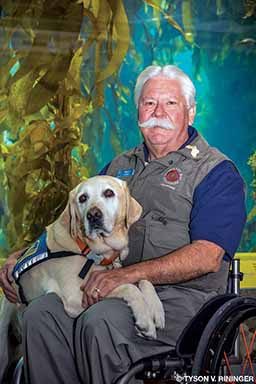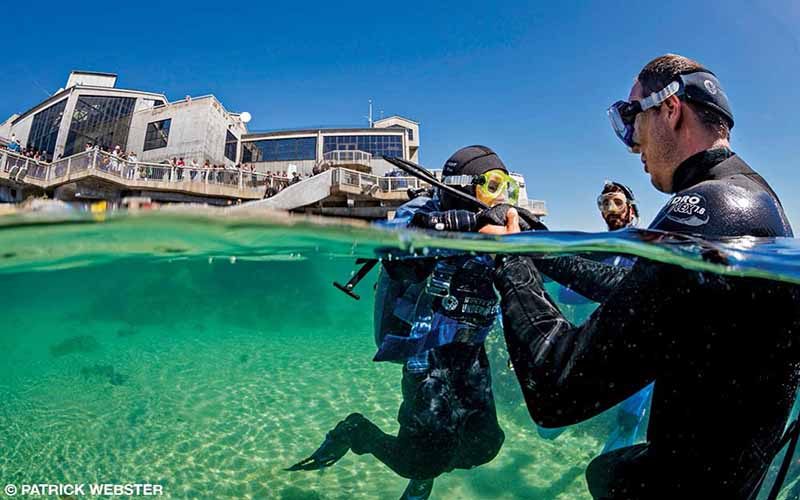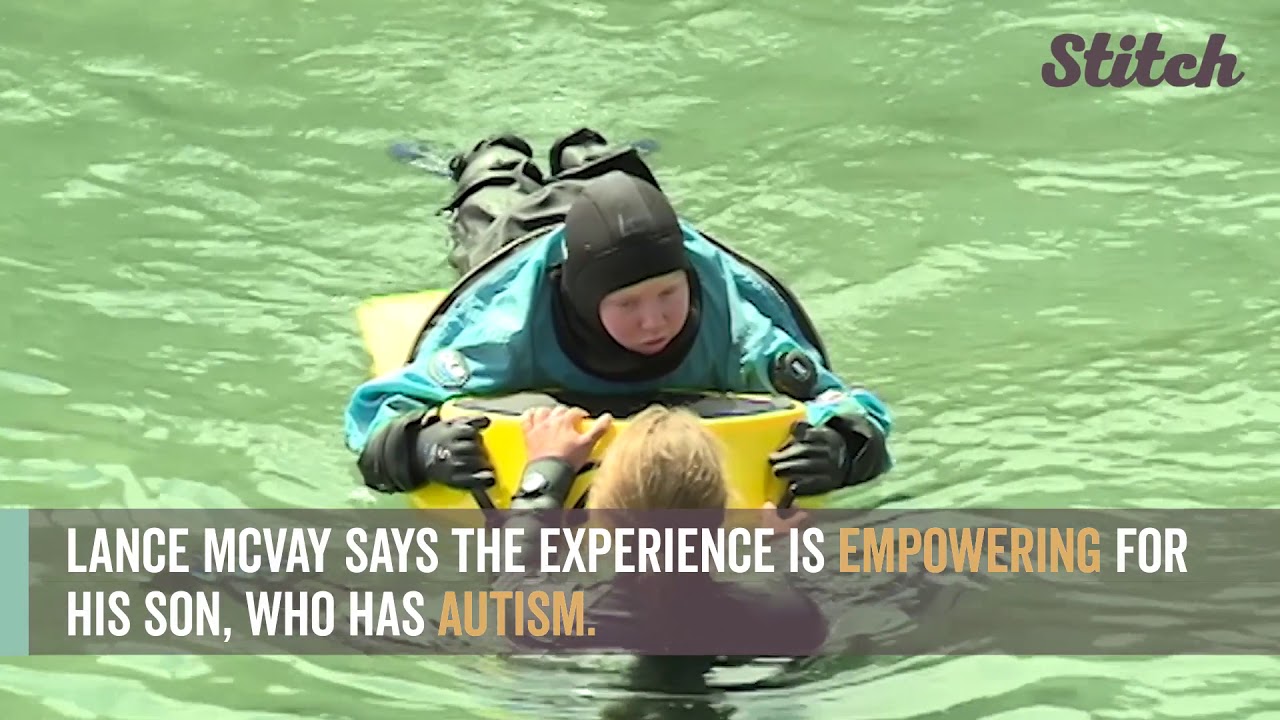The cure for anything is salt water: sweat, tears or the sea, wrote author Isak Dinesen. As divers, most of us can attest to the last. Children with disabilities also have the chance to feel the healing power of the ocean, thanks to a long-running program at California’s Monterey Bay Aquarium. Every summer these children park their wheelchairs and leave behind other physical and emotional constraints of their daily lives to experience the wonders of the Pacific Ocean.
Part of the aquarium’s summertime Underwater Explorers program (a daily surface scuba diving activity for kids), Days of Discovery allows children between the ages of 8 and 14 with varying disabilities and special needs to experience the ocean with the help of certified dive staff at the aquarium’s Great Tide Pool. In partnership with the Salinas Valley Memorial Hospital Foundation and Children’s Miracle Network, the program celebrated its 17th year in 2018.
The Great Tide Pool, a natural tidal pool next to the aquarium, is surrounded by viewing decks and offers an ideal controlled environment for learning diving basics. Days of Discovery gives children with physical and cognitive differences the support they need to zip into a drysuit and peer down into the ocean. The diving is a modified type of snorkeling, which allows the children to float on the surface while breathing through a regulator without being fully submerged.

“We refer to Day of Discovery as the absolute best day of the year at the aquarium, even though it is in fact three different days,” said George Peterson, the aquarium’s director of dive programs. “We put people in the Pacific Ocean and let it do its work.”
Children whose lives are affected by everything from amputations and cerebral palsy to hearing and visual impairments and autism require an extensive support network, from customized gear to a village of wet and dry volunteers. That’s where the program’s many volunteer divers and shore-based volunteers come into the equation, among them one special paraplegic diver and his golden labrador.
Since the program’s inception, Marv Tuttle, the aquarium’s first wheelchair-using volunteer diver and the participant coordinator for the program, has been at Days of Discovery to greet families and help the children prepare for what’s often the biggest adventure of their young lives.
A Vietnam War veteran, Tuttle sustained a spinal cord injury from a motorcycle accident in 1998 and is mostly paralyzed from the waist down. A diver before his accident, he rediscovered the healing powers of the water during treatments in a swimming pool while he was rehabilitating his injury.
“Even with just that freshwater buoyancy, I was amazed when I got in the water again,” Tuttle said. “Getting back on a motorcycle would have been grounds for a divorce at that point, so I thought, ‘What other outlet can I find that can be done with paralysis?’”
That’s when Tuttle attended an event at the beach in Santa Cruz, California, that gave him the chance to get geared up and dive in the ocean.
“Two volunteer divers from the aquarium who had been in the water with me that day told me afterward that they hadn’t even realized I was a wheelchair user until I exited the water,” Tuttle recalled. The men promptly invited him to consider being the aquarium’s first wheelchair-using volunteer diver. That was in 2002, and Tuttle has siphoned a lot of tank bottoms and scrubbed many a window in the aquarium’s iconic living kelp forest exhibit since then.
“Gravity is not allowed in the water,” he said, “And whether I get in an exhibit to dive, or roll off the back of a dive boat, gravity has to sit there and wait for me to come back. I become air stingy, I breathe shallower, I move more slowly.”

Tuttle’s main passion these days is helping recruit kids and prepare their families for Days of Discovery. He’s there on event days, signing in families and spreading smiles with his Canine Companions for Independence assistance dog, Yara, who helps him with his daily activities and is a whiz at calming the nerves of both the program’s participants and their oft-wary families who arrive with little knowledge of diving.
Yara works her magic by laying a furry head in a lap, an instant nerve calmer in many cases, according to Tuttle, who has faced his own challenges relaying to families the benefits of getting their kids into the ocean.
“When I try to recruit parents to the program, I say this sport is so unique because we’re doing things we’re not supposed to be doing as human beings: We’re breathing underwater,” Tuttle explained, adding that the day of the event is when everything usually falls into place. “That’s when we have vision-impaired kids, hearing-impaired kids, kids on the autism spectrum and those with a variety of physical abilities discovering, ‘Wow, this weightless sensation is awesome!’
“On the Day of Discovery, they’ve left their wheelchairs and their prosthetic limbs on the upper deck, and they’re down in the Great Tide Pool in drysuits, all encased and bobbing like corks,” he said.
It’s a sight that doesn’t leave many dry eyes among observers as they see the children’s joy; the aquarium operates as usual on the event days, so the public is welcome to watch. The children’s families enjoy free aquarium admission for the day. For the kids who aren’t able to enter the water, volunteer divers surface from the Great Tide Pool with sloshing trays of tidal zone denizens such as hermit crabs, urchins and limpets to show them.
“For these 30 or 40 minutes in the water, the kids don’t reflect on their disability the way they do with their walker or in their wheelchair,” Tuttle said. “There’s nothing like seeing a child’s wheelchair on the platform, prosthetic legs next to it, and knowing their owners are off on a new adventure without them, in an ocean realm out of reach before this moment.”
The result for anyone who gets up close and personal with the ocean is the same for most people. “You put kids in the water, and they end up loving the experience,” Peterson said. “They love the animals and take that love and curiosity to the next level, becoming stewards for the ocean in all walks of life.”
Explore More
| © Alert Diver — Q3 2018 |

